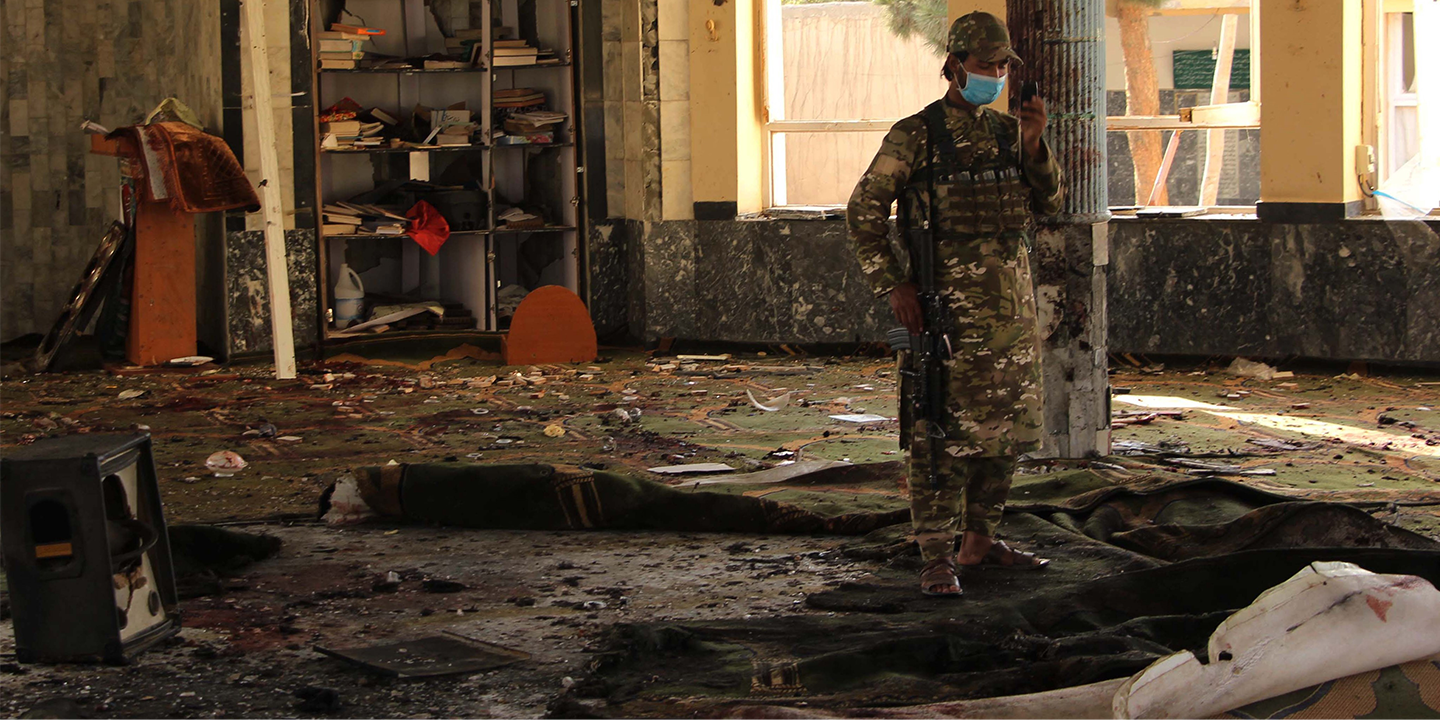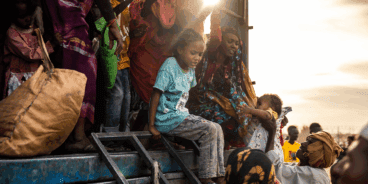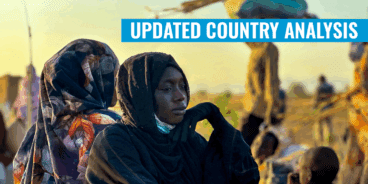

Atrocity Alert No. 274: Afghanistan, Yemen and China
Atrocity Alert is a weekly publication by the Global Centre for the Responsibility to Protect highlighting situations where populations are at risk of, or are enduring, mass atrocity crimes.
DEADLY ATTACKS TARGETING RELIGIOUS INSTITUTIONS IN AFGHANISTAN
On 8 October a suicide bomb detonated in Gozar-e-Sayed Abad Mosque in Kunduz, Afghanistan, killing at least 43 civilians and injuring more than 140, the majority of whom were ethnic Hazara. This was the third deadly attack against a religious institution in Afghanistan in less than a week, including attacks at Eid Gah Mosque in Kabul on 3 October and Mazharul Alum Madrasra in Khost province on 6 October that caused dozens of civilian casualties. The so-called Islamic State of Iraq and the Levant-Khorasan (ISIL-K) have claimed responsibility for the attacks on 3 and 8 October.
UN Secretary-General António Guterres condemned the bombing in Kunduz, emphasizing that, “attacks that deliberately target civilians exercising the right to freely practice their religion are violations of fundamental human rights and international humanitarian law.” The Office of the UN High Commissioner for Human Rights stated that the spate of attacks against religious institutions “signals a disturbing pattern of violence” that “highlights the vulnerability of ordinary Afghans, especially religious minorities.”
ISIL-K frequently targets the Shia minority in Afghanistan, particularly the Hazara. During May the group perpetrated a bomb attack in front of the Sayed Al-Shuhada school in the Hazara neighborhood of Dasht-e-Barchi, Kabul, killing over 85 Hazaras, including children. A series of attacks in Dasht-e-Barchi throughout June – many of which were claimed by ISIL-K – killed over 25 civilians. ISIL-K also claimed responsibility for the deadly bombing on 26 August at the airport in Kabul as Afghans attempted to flee the country, killing at least 170 Afghan civilians and 13 United States troops.
Hazaras are also facing heightened risk of atrocity crimes following the Taliban takeover on 15 August. According to recent reporting from Amnesty International, Taliban forces unlawfully executed 13 Hazaras in Daykundi province on 30 August.
In an important first step following the Taliban takeover, the UN Human Rights Council (HRC) voted on 7 October to appoint a Special Rapporteur to monitor and report on the human rights situation in Afghanistan. Given the increasing atrocity risks posed to vulnerable populations, the HRC and other UN bodies should build upon this mandate and ensure robust monitoring of violations and abuses of international law by all actors in Afghanistan. Taliban de-facto authorities should cooperate with and facilitate access for the Special Rapporteur and any other human rights monitoring mechanisms.
UN HUMAN RIGHTS COUNCIL TERMINATES CRUCIAL YEMEN MONITORING BODY
On 7 October the UN Human Rights Council (HRC) failed to pass a resolution to renew the mandate of the Group of Eminent Experts (GEE) on Yemen. This marked the first time a mandate for a mechanism was voted down since the creation of the HRC in 2006. The HRC vote followed heavy diplomatic and political pressure from Saudi Arabia, a party to the conflict in Yemen being investigated by the GEE.
The GEE called the voting results “a major setback for all victims who have suffered serious violations during the armed conflict that has been raging for over six years in Yemen.” The experts further added that, “by ending the only United Nations independent entity investigating and issuing detailed public reports on human rights violations committed by all parties to the conflict in Yemen, the Council appears to be abandoning the people of Yemen.”
The GEE was established by the HRC in 2017 to monitor and report on all alleged violations and abuses of international law in Yemen and, where possible, to identify those responsible. To date the GEE has produced four annual reports detailing likely war crimes and crimes against humanity, including indiscriminate airstrikes and shelling, arbitrary detention, enforced disappearances, grave violations against children, unlawful humanitarian restrictions, sexual and gender-based violence, and torture.
Against the backdrop of the vote, violations of international law by all parties to the conflict remain ongoing throughout the 49 active frontlines across the country. Over 1,300 civilians have been killed or maimed so far this year. Amidst a Houthi offensive in Marib, indiscriminate missiles have regularly targeted civilian objects, causing civilian casualties and large-scale displacement.
Jahaan Pittalwala, Research Analyst at the Global Centre for the Responsibility to Protect, said that, “the failure to renew the GEE mandate is a devastating blow to the fight against impunity for atrocity crimes in Yemen. The HRC must correct course at its 49th session and re-establish the mandate of the GEE. It is imperative that the international community ensure accountability for all violations of international law in Yemen.”
WHISTLEBLOWER RECOUNTS TORTURE INFLICTED ON DETAINED UYGHURS IN CHINA
An exiled Chinese police officer-turned-whistleblower shared rare details about the “systematic campaign of torture” that police officers and guards inflict on detained Uyghurs (or Uighurs) and other persecuted groups in the Xinjiang Uyghur Autonomous Region (XUAR) in interviews published by CNN and Sky News on 5 and 11 October. This rare account from a perpetrator, known only as “Jiang,” underscores the extreme and systematic measures that the Chinese government employs in its campaign against the Uyghur population.
Under the guise of combatting religious extremism and terrorism, in recent years the government of China and authorities in XUAR have detained an estimated 1 million Uyghurs and other Muslim minorities in “re-education” or “de-extremification” facilities without formal charges or due process. China’s policies have resulted in large-scale arbitrary detention, severe restrictions on religious practice and repressive population control policies, which may amount to crimes against humanity and genocide. The Chinese government has consistently denied any wrongdoing.
Jiang reported that in his experience, every new detainee – including men, women and children as young as 14 – was beaten during the interrogation process. Tactics included hanging people from the ceiling, sexual violence, waterboarding, electrocutions, shackling people to “tiger chairs” designed to immobilize suspects, and withholding food and water. One “very common” tactic was to order detainees to gang-rape new male prisoners. According to Jiang, the torture stopped only when the suspects confessed – often to spurious terrorism charges – and from there they were often transported to an internment camp or prison.
Jiang also shed light on the dire conditions Uyghur detainees endured on tightly packed freight trains, with more than 100 prisoners per carriage. These trains often transported hundreds of Uyghurs who had traveled to other parts of China back to Xinjiang. Transport often lasted multiple days and prisoners were denied food and the ability to use the toilet.
Liam Scott, Research Associate at the Global Centre for the Responsibility to Protect, said that, “the human rights violations Jiang described reach a horrifying level of dehumanization. His testimony not only corroborates survivors’ reports of grave abuses against Uyghurs and other minorities in Xinjiang but should also push the international community to reaffirm its duty to uphold its responsibility to protect these long-persecuted groups.”
Related Content


Atrocity Alert No. 459: Sudan, Ukraine and Conflict-Related Food Insecurity
